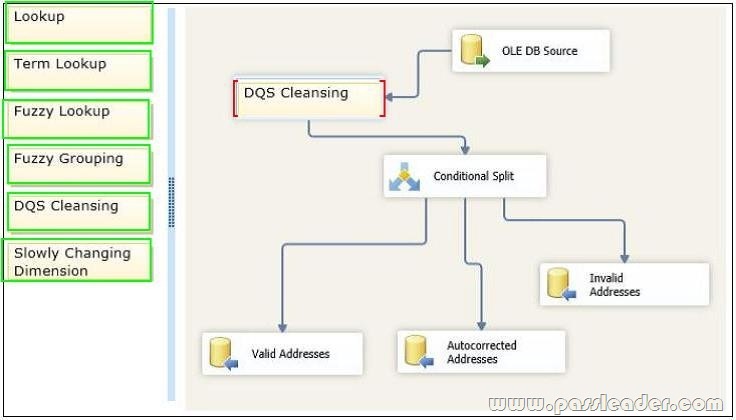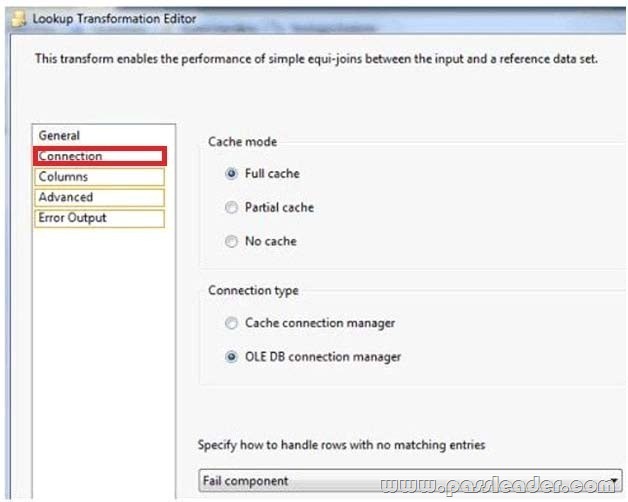Valid 70-767 Dumps shared by PassLeader for Helping Passing 70-767 Exam! PassLeader now offer the newest 70-767 VCE dumps and 70-767 PDF dumps, the PassLeader 70-767 exam questions have been updated and ANSWERS have been corrected, get the newest PassLeader 70-767 dumps with VCE and PDF here: https://www.passleader.com/70-767.html (318 Q&As Dumps –> 350 Q&As Dumps –> 377 Q&As Dumps –> 407 Q&As Dumps)
BTW, DOWNLOAD part of PassLeader 70-767 dumps from Cloud Storage: https://drive.google.com/open?id=0B-ob6L_QjGLpcXZXWUl4dHhIUVk
QUESTION 1
You are reviewing the design of a customer dimension table in an existing data warehouse hosted on SQL Azure. The current dimension design does not allow the retention of historical changes to customer attributes such as Postcode. You need to redesign the dimension to enable the full historical reporting of changes to multiple customer attributes including Postcode. What should you do?
A. Add StartDate and EndDate columns to the customer dimension.
B. Add an IsCurrent column to the customer dimension.
C. Enable Snapshot Isolation on the data warehouse.
D. Add CurrentValue and PreviousValue columns to the customer dimension.
Answer: A
QUESTION 2
You are implementing the indexing strategy for a fact table in a data warehouse. The fact table is named Quotes. The table has no indexes and consists of seven columns:
– [ID]
– [QuoteDate]
– [Open]
– [Close]
– [High]
– [Low]
– [Volume]
Each of the following queries must be able to use a columnstore index:
SELECT AVG ([Close]) AS [AverageClose] FROM Quotes WHERE [QuoteDate] BETWEEN ‘20100101’ AND ‘20101231’.
SELECT AVG ([High] – [Low]) AS [AverageRange] FROM Quotes WHERE [QuoteDate] BETWEEN ‘20100101’ AND ‘20101231’.
SELECT SUM ([Volume]) AS [SumVolume] FROM Quotes WHERE [QuoteDate] BETWEEN ‘20100101’ AND ‘20101231’.
You need to ensure that the indexing strategy meets the requirements. The strategy must also minimize the number and size of the indexes. What should you do?
A. Create one columnstore index that contains [ID], [Close], [High], [Low], [Volume], and [QuoteDate].
B. Create three coiumnstore indexes:
One containing [QuoteDate] and [Close]
One containing [QuoteDate], [High], and [Low]
One containing [QuoteDate] and [Volume]
C. Create one columnstore index that contains [QuoteDate], [Close], [High], [Low], and [Volume].
D. Create two columnstore indexes:
One containing [ID], [QuoteDate], [Volume], and [Close]
One containing [ID], [QuoteDate], [High], and [Low]
Answer: C
Explanation:
http://msdn.microsoft.com/en-us/library/gg492088.aspx
http://msdn.microsoft.com/en-us/library/gg492153.aspx
QUESTION 3
You are designing an enterprise star schema that will consolidate data from three independent data marts. One of the data marts is hosted on SQL Azure. Most of the dimensions have the same structure and content. However, the geography dimension is slightly different in each data mart. You need to design a consolidated dimensional structure that will be easy to maintain while ensuring that all dimensional data from the three original solutions is represented. What should you do?
A. Create a junk dimension for the geography dimension.
B. Implement change data capture.
C. Create a conformed dimension for the geography dimension.
D. Create three geography dimensions.
Answer: C
QUESTION 4
To facilitate the troubleshooting of SQL Server Integration Services (SSIS) packages, a logging methodology is put in place. The methodology has the following requirements:
– The deployment process must be simplified.
– All the logs must be centralized in SQL Server.
– Log data must be available via reports or T-SQL.
– Log archival must be automated.
You need to configure a logging methodology that meets the requirements while minimizing the amount of deployment and development effort. What should you do?
A. Open a command prompt and run the gacutil command.
B. Open a command prompt and execute the package by using the SQL Log provider and running the dtexecui.exe utility.
C. Add an OnError event handler to the SSIS project.
D. Use an msi file to deploy the package on the server.
E. Configure the output of a component in the package data flow to use a data tap.
F. Run the dtutil command to deploy the package to the SSIS catalog and store the configuration in SQL Server.
G. Open a command prompt and run the dtexec/rep/conn command.
H. Open a command prompt and run the dtutil/copy command.
I. Open a command prompt and run the dtexec/dumperror/conn command.
J. Configure the SSIS solution to use the Project Deployment Model.
K. Create a reusable custom logging component and use it in the SSIS project.
Answer: J
Explanation:
http://msdn.microsoft.com/en-us/library/ms140246.aspx
http://msdn.microsoft.com/en-us/library/hh231187.aspx
QUESTION 5
You are developing a SQL Server Integration Services (SSIS) project that copies a large amount of rows from a SQL Azure database. The project uses the Package Deployment Model. This project is deployed to SQL Server on a test server. You need to ensure that the project is deployed to the SSIS catalog on the production server. What should you do?
A. Open a command prompt and run the dtexec/dumperror/conn command.
B. Create a reusable custom logging component and use it in the SSIS project.
C. Open a command prompt and run the gacutil command.
D. Add an OnError event handler to the SSIS project.
E. Open a command prompt and execute the package by using the SQL Log provider and running the dtexecui.exe utility.
F. Open a command prompt and run the dtexec/rep/conn command.
G. Open a command prompt and run the dtutil/copy command.
H. Use an msi file to deploy the package on the server.
I. Configure the SSIS solution to use the Project Deployment Model.
J. Configure the output of a component in the package data flow to use a data tap.
K. Run the dtutil command to deploy the package to the SSIS catalog and store the configuration in SQL Server.
Answer: I
Explanation:
http://msdn.microsoft.com/en-us/library/hh231102.aspx
http://msdn.microsoft.com/en-us/library/hh213290.aspx
http://msdn.microsoft.com/en-us/library/hh213373.aspx
QUESTION 6
You are developing a SQL Server Integration Services (SSIS) package. To process complex scientific data originating from a SQL Azure database, a custom task component is added to the project. You need to ensure that the custom component is deployed on a test environment correctly. What should you do?
A. Add an OnError event handler to the SSIS project.
B. Open a command prompt and run the gacutil command.
C. Configure the SSIS solution to use the Project Deployment Model.
D. Open a command prompt and run the dtexec/dumperror/conn command.
E. Configure the output of a component in the package data flow to use a data tap.
F. Open a command prompt and execute the package by using the SQL Log provider and running the dtexecui.exe utility.
G. Open a command prompt and run the dtexec/rep/conn command.
H. Run the dtutil command to deploy the package to the SSIS catalog and store the configuration in SQL Server.
I. Use an msi file to deploy the package on the server.
J. Open a command prompt and run the dtutil/copy command.
K. Create a reusable custom logging component and use it in the SSIS project.
Answer: B
Explanation:
http://msdn.microsoft.com/en-us/library/ms403356.aspx
QUESTION 7
Drag and Drop Question
A SQL Server Integration Services (SSIS) project has been deployed to the SSIS catalog. The project includes a project Connection Manager to connect to the data warehouse. The SSIS catalog includes two Environments:
– Development
– QA
Each Environment defines a single Environment Variable named ConnectionString of type string. The value of each variable consists of the connection string to the development or QA data warehouses. You need to be able to execute deployed packages by using either of the defined Environments. Which three actions should you perform in sequence? (To answer, move the appropriate actions from the list of actions to the answer area and arrange them in the correct order.)

QUESTION 8
You develop and deploy a SQL Server Integration Services (SSIS) package. The package is stored in the file system. You need to execute the package without importing it to the SSIS server. What should you use to execute the package? (Each correct answer presents a complete solution. Choose all that apply.)
A. catalog.start_package
B. dtexec
C. SQL Server Management Studio
D. SQL Server Agent
Answer: BD
Explanation:
http://technet.microsoft.com/en-us/library/ms141708(v=sql.110).aspx
QUESTION 9
Drag and Drop Question
You use SQL Server Integration Services (SSIS) for extract, transformation, load (ETL) processing. Issues concerning addresses are discovered in the data warehouse that you manage. Validation must separate the addresses into three categories:
– Valid addresses
– Autocorrected addresses
– Invalid addresses
You need to enhance the SSIS packages to perform address validation by using an external service. Which transformation should you use? (To answer, drag the appropriate transformation from the list of options to the correct location or locations in the answer area.)
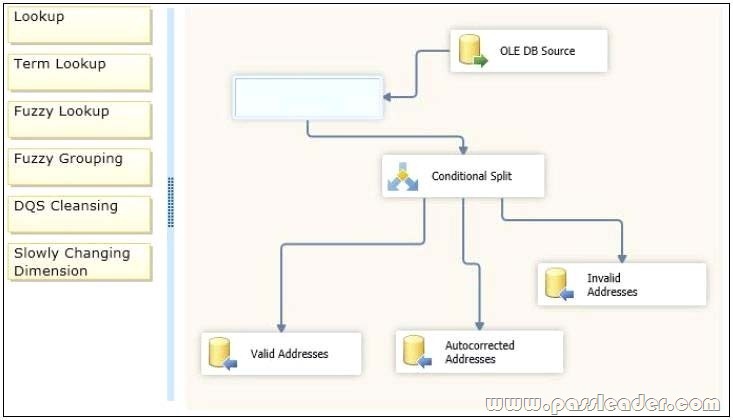
QUESTION 10
You are developing a data flow transformation to merge two data sources. One source contains product data and the other source contains data about the country in which the product was manufactured. Both data sources contain a two-character CountryCode column and both use SQL Server. Both data sources contain an ORDER BY clause to sort the data by the CountryCode column in ascending order. You use a Merge Join transformation to join the data. You need to ensure that the Merge Join transformation works correctly without additional transformations. What should you do? (Each correct answer presents part of the solution. Choose all that apply.)
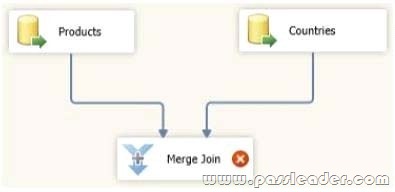
A. Change the ORDER BY clause on the product source to order by ProductName.
B. Change the Merge Join transformation to a Merge transformation.
C. Set the appropriate SortKeyPosition properties on the data sources.
D. Set the IsSorted property on both data sources.
Answer: CD
QUESTION 11
You are developing a SQL Server Integration Services (SSIS) package. You need to design a package to change a variable value during package execution by using the least amount of development effort. What should you use?
A. Expression task
B. Script task
C. Execute SQL task
D. Execute Process task
E. Term Extraction transformation
Answer: A
Explanation:
http://msdn.microsoft.com/en-us/library/hh213137.aspx
QUESTION 12
Hotspot Questions
You are developing a data flow to load sales data into a fact table. In the data flow, you configure a Lookup Transformation in full cache mode to look up the product data for the sale. The lookup source for the product data is contained in two tables. You need to set the data source for the lookup to be a query that combines the two tables. Which page of the Lookup Transformation Editor should you select to configure the query? (To answer, select the appropriate page in the answer area.)
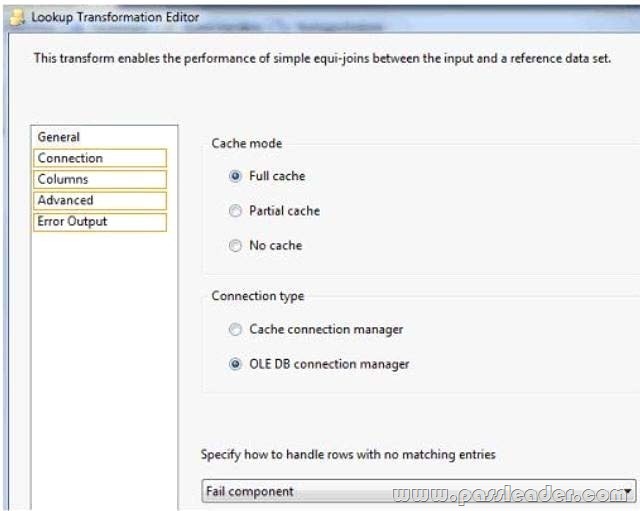
QUESTION 13
You are creating a SQL Server Integration Services (SSIS) package to retrieve product data from two different sources. One source is hosted in a SQL Azure database. Each source contains products for different distributors. Products for each distributor source must be combined for insertion into a single product table destination. You need to select the appropriate data flow transformation to meet this requirement. Which transformation types should you use? (Each correct answer presents a complete solution. Choose all that apply.)
A. Multicast
B. Merge Join
C. Term Extraction
D. union All
E. Merge
Answer: DE
Explanation:
http://msdn.microsoft.com/en-us/library/ms141703.aspx
http://msdn.microsoft.com/en-us/library/ms141775.aspx
http://msdn.microsoft.com/en-us/library/ms141020.aspx
http://msdn.microsoft.com/en-us/library/ms141809.aspx
http://msdn.microsoft.com/en-us/library/ms137701.aspx
QUESTION 14
You are using SQL Server Data Tools to develop a SQL Server Integration Services (SSIS) project. The first package that you create in this project contains a package connection that accesses a flat file. Additional packages in the project must also access this file. You need to define and reuse the flat file connection in all project packages. What should you do?
A. Convert the package Connection Manager in the first package to a project Connection Manager.
B. Copy the package Connection Manager and paste it into the second package.
C. Convert the project to the Package Deployment model.
D. Set the ProtectionLevel property of the package Connection Manager to DontSaveSensitive to reuse the flat file connection.
Answer: A
QUESTION 15
Drag and Drop Question
A Data Flow task in a SQL Server Integration Services (SSIS) package produces run-time errors. You need to edit the package to log specific error messages. Which three actions should you perform in sequence? (To answer, move the appropriate actions from the list of actions to the answer area and arrange them in the correct order.)

QUESTION 16
You are designing a SQL Server Integration Services (SSIS) package that uses the Fuzzy Lookup transformation. The reference data to be used in the transformation does not change. You need to reuse the Fuzzy Lookup match index to increase performance and reduce maintenance. What should you do?
A. Select the GenerateAndPersistNewIndex option in the Fuzzy Lookup Transformation Editor.
B. Select the GenerateNewIndex option in the Fuzzy Lookup Transformation Editor.
C. Select the DropExistingMatchlndex option in the Fuzzy Lookup Transformation Editor.
D. Execute the sp_FuzzyLookupTableMaintenanceUninstall stored procedure.
E. Execute the sp_FuzzyLookupTableMaintenanceInvoke stored procedure.
Answer: A
Explanation:
http://msdn.microsoft.com/en-us/library/ms137786.aspx
QUESTION 17
You are using a SQL Server Integration Services (SSIS) project that is stored in the SSIS catalog. An Environment has been defined in the SSIS catalog. You need to add the Environment to the project. Which stored procedure should you use?
A. catalog.set_environment_reference_type
B. catalog.set_environment_property
C. catalog.create_environment_reference
D. catalog.create_environment
Answer: C
QUESTION 18
Drag and Drop Question
You are developing a SQL Server Integration Services (SSIS) package that imports data into a data warehouse. You are developing the part of the SSIS package that populates the ProjectDates dimension table. The business key of the ProjectDates table is the ProjectName column. The business user has given you the dimensional attribute behavior for each of the four columns in the ProjectDates table:
– ExpectedStartDate – New values should be tracked over time.
– ActualStartDate – New values should not be accepted.
– ExpectedEndDate – New values should replace existing values.
– ActualEndDate – New values should be tracked over time.
You use the SSIS Slowly Changing Dimension Transformation. You must configure the Change Type value for each source column. Which settings should you select? (To answer, select the appropriate setting or settings in the answer area.)

QUESTION 19
You are developing a SQL Server Integration Services (SSIS) package that imports data into a data warehouse hosted on SQL Azure. The package uses a Foreach container to process text files found in a folder. The package must be deployed to a single server by using the Project Deployment model. Multiple SQL Server Agent jobs call the package. Each job is executed on a different schedule. Each job passes a different folder path to the package. You need to configure the package to accept the folder path from each job. Which package configuration should you use?
A. .dtsConfig file
B. Registry Entry
C. Environment Variable
D. Parent Package Variable
E. XML Configuration File
Answer: C
Explanation:
http://msdn.microsoft.com/en-us/library/ms345179.aspx
http://msdn.microsoft.com/en-us/library/ms141708.aspx
http://msdn.microsoft.com/en-us/library/hh213214.aspx
http://msdn.microsoft.com/en-us/library/hh213296.aspx
http://msdn.microsoft.com/en-us/library/hh213293.aspx
QUESTION 20
Drag and Drop Questions
You are designing a SQL Server Integration Services (SSIS) package. The package moves order-related data to a staging table named Order. Every night the staging data is truncated and then all the recent orders from the online store database are inserted into the staging table. Your package must meet the following requirements:
– If the truncate operation fails, the package execution must stop and report an error.
– If the Data Flow task that moves the data to the staging table fails, the entire refresh operation must be rolled back.
– For auditing purposes, a log entry must be entered in a SQL log table after each execution of the Data Flow task.
The TransactionOption property for the package is set to Required. You need to design the package to meet the requirements. How should you design the control flow for the package? (To answer, drag the appropriate setting from the list of settings to the correct location or locations in the answer area.)
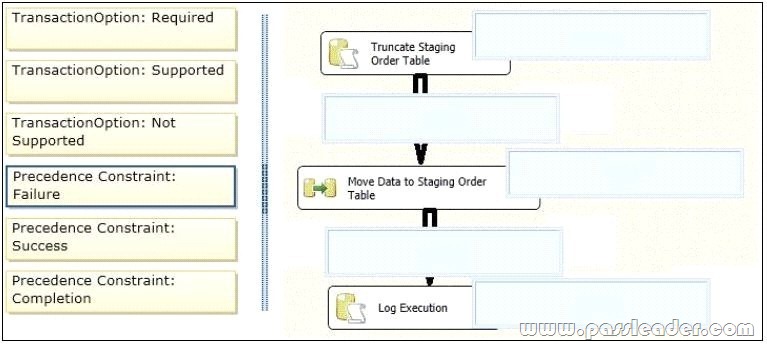
Get the newest PassLeader 70-767 VCE dumps here: https://www.passleader.com/70-767.html (318 Q&As Dumps –> 350 Q&As Dumps –> 377 Q&As Dumps –> 407 Q&As Dumps)
And, DOWNLOAD the newest PassLeader 70-767 PDF dumps from Cloud Storage for free: https://drive.google.com/open?id=0B-ob6L_QjGLpcXZXWUl4dHhIUVk

